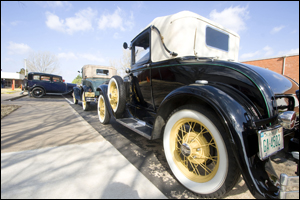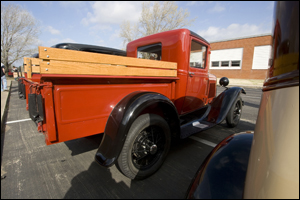Tulsa Model A Ford Club brings history to OSU-Okmulgee automotive technologies students
Thursday, April 3, 2008


“The Model A was the first modern car, compared to the ‘Tin Lizzy’ or ‘Model T,’” said Cail. “Henry Ford decided he needed to build a car that was easier to drive and operate. In just two years, his company redesigned the body, chassis, motor and transmission and converted 30 manufacturing plants to Model A production. There’s a real story here about motivation, ingenuity and customer service.”
Tim Dwyer, instructor for the Pro Tech Automotive Technology program at OSU-Okmulgee, says there are still remnants of these antiques in the cars of today. “I like showing students the ignition systems, the suspension systems. The Model A was a huge advancement over the horse and buggy, but compared to the cars of today it is very primitive. Still, the end result is the same. You’re still getting from point A to point B. It is just accomplished a whole different way today.”
The 17 Model A’s making the trip were all manufactured between 1928 and 1931. Models vary from sedans to coupes, roadsters, pickups and trucks. Cail said all cars in the Tulsa Model A Ford Club are stock, except some have slight modifications to make them more roadworthy. “Many people are surprised to see the range of colors for Model A’s; although the fenders were always black.”
Colin Jarrett, of Duncan, an automotive student in the Pro Tech program at OSU-Okmulgee, said he enjoyed seeing the Model A’s because he loves antique cars. “The shop where I work refurbishes old cars. These Model A’s really get me excited by showing how far we have come with motors, suspensions and tires. For example, I noticed the truck leaf springs make a mustache shape versus the U shape of today’s cars. There is also a big difference in the motors – the old flat head with just a few cylinders, compared to the inline, pancake or V-shaped arrangement on today’s cars.”
Following the exhibit, Model A club members ate at the famed OSU-Okmulgee “Grand Buffet” offered on Thursdays by students in the Culinary Arts department.
“This school is refreshingly different,” says Cail – who used to work at the college. “Everywhere you look, students are involved in hands-on learning. They remember what they learn and they have a strong sense of accomplishment – just as we do about restoring our cars.”
